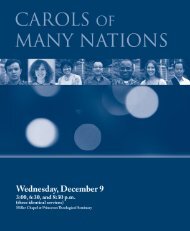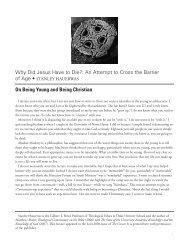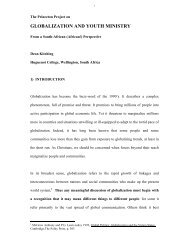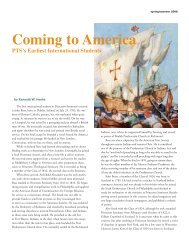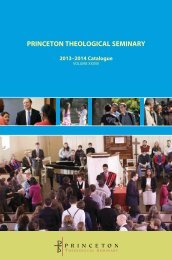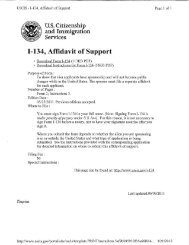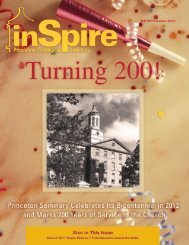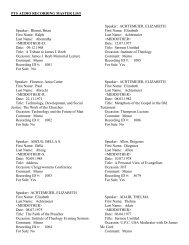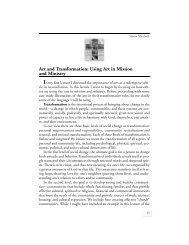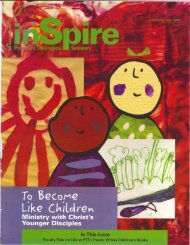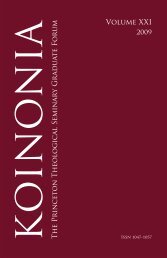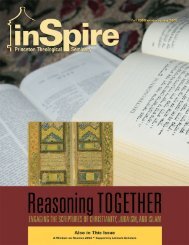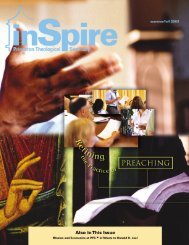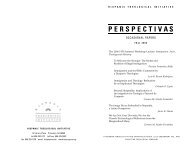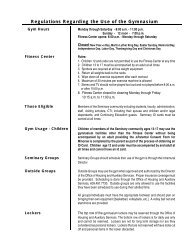PTS Catalogue - Princeton Theological Seminary
PTS Catalogue - Princeton Theological Seminary
PTS Catalogue - Princeton Theological Seminary
You also want an ePaper? Increase the reach of your titles
YUMPU automatically turns print PDFs into web optimized ePapers that Google loves.
completion of the Comprehensive Examinations. The proposal should contain<br />
within it a recommendation for the constitution of a Dissertation Committee. The<br />
Department will record the area colleagues’ evaluation of the proposal and will act<br />
on the recommendation for a Dissertation Committee, forwarding both findings<br />
onto the Office of Academic Affairs, Ph.D. Studies.<br />
AREA II: History and Ecumenics<br />
1. Church History and History of Doctrine<br />
At <strong>PTS</strong>, the history of Christianity, commonly referred to as Church History and the<br />
History of Doctrine, is an integrative, interdisciplinary program that encompasses<br />
social, theological, institutional, and cultural history of the world’s Christian communities,<br />
their ideas, and their practices. It also offers resources from related fields<br />
in the history of religions, history of worship, sociology of religion, missiology, and<br />
ecumenism. The program’s goal is to train scholars to develop an area of specialization<br />
within a context of breadth, balancing particular interests with an attention to<br />
Christianity’s larger history and global expansion.<br />
Residence Requirements<br />
The program in Church History and History of Doctrine includes five eras: the early<br />
church, the medieval church, the Reformation, the modern European church,<br />
the American church. Over the two years of residence, a student must successfully<br />
complete eight doctoral seminars. The purpose of coursework is to develop<br />
historical breadth, hone research skills, and prepare for comprehensive exams.<br />
Students must choose these seminars in consultation with their advisers<br />
to constitute a coherent core of studies while meeting the following<br />
distribution requirements:<br />
1. A departmental seminar or individual tutorial on historical method<br />
2. Church History seminars in at least three different eras (early, medieval,<br />
Reformation, modern, American)<br />
3. One seminar chosen from doctoral offerings at <strong>Princeton</strong> University<br />
4. At least one seminar from among the department’s broader offerings,<br />
such as mission, ecumenics, history of religions, and sociology of religion<br />
5. Two electives, chosen from doctoral courses of the department, the rest<br />
of the <strong>Seminary</strong>, or the University<br />
Ph.D. candidates are free to audit other courses in the <strong>Seminary</strong> catalogue, such<br />
as those offered in the master’s program. If such courses are taken for Ph.D. credit,<br />
additional work will usually be required.<br />
Language proficiency in French and German is required. Ph.D. candidates are<br />
also encouraged to develop further language skills through auditing <strong>Seminary</strong><br />
courses or enrolling in appropriate University courses. These opportunities, however,<br />
do not count toward the eight seminars.<br />
!# 65#"<br />
cat1213



